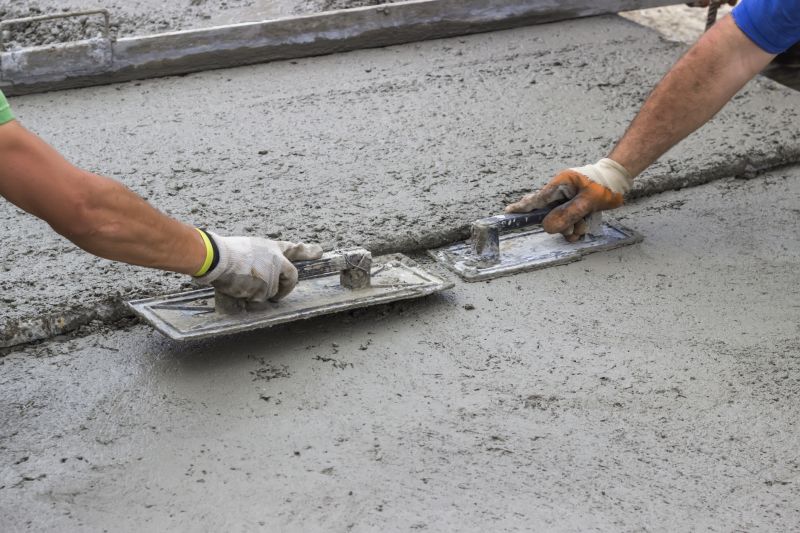Ultimate Selection Of Concrete Repair Products For Long-Lasting Fixes
Browse our comprehensive list of products designed to provide durable and effective concrete restoration.
 Concrete repair products are essential for maintaining the integrity and appearance of concrete surfaces in residential, commercial, and industrial settings. Whether addressing small cracks, surface spalls, or larger structural issues, selecting the appropriate repair materials is crucial for achieving durable and lasting results. The variety of products available includes patching compounds, fillers, sealants, and bonding agents, each designed to serve specific repair needs. Proper application and choosing the right product can help prevent further deterioration and extend the lifespan of concrete structures.
Concrete repair products are essential for maintaining the integrity and appearance of concrete surfaces in residential, commercial, and industrial settings. Whether addressing small cracks, surface spalls, or larger structural issues, selecting the appropriate repair materials is crucial for achieving durable and lasting results. The variety of products available includes patching compounds, fillers, sealants, and bonding agents, each designed to serve specific repair needs. Proper application and choosing the right product can help prevent further deterioration and extend the lifespan of concrete structures.
Top Overall Option
Polymer-Modified Concrete Patch
A versatile polymer-modified concrete patch offers excellent adhesion, flexibility, and durability. It is suitable for filling cracks, spalls, and surface defects, providing a resilient repair that can accommodate slight movements without cracking. Its ease of application and compatibility with existing concrete make it a reliable choice for various repair scenarios in Louisville, KY.
Types of Products For Concrete Repairs
Pre-mixed Concrete Patch
Ready-to-use patches designed for quick repairs of surface cracks and small holes.
Epoxy Injection Resin
Used for structural crack repairs, providing strong bonding and sealing properties.
Hydraulic Cement
Ideal for stopping active water leaks and repairing damaged concrete surfaces exposed to moisture.
Polyurethane Sealant
Flexible sealant suitable for sealing joints and cracks that experience movement.
Acrylic Concrete Crack Filler
Acrylic-based fillers ideal for surface cracks and minor repairs with easy application.
Surface Patching Compound
Materials designed for leveling and smoothing uneven or damaged concrete surfaces.
Bonding Agent
Adhesive primer that enhances the bond between old and new concrete layers.
Concrete Resurfacer
Thin-layer coatings that restore the appearance and surface integrity of worn concrete.
Crack Repair Tape
Reinforcing tape used to stabilize cracks before applying repair compounds.
Polymer Cement Mix
A cement-based product enhanced with polymers for improved adhesion and flexibility.
Fast-Setting Repair Mortar
Mortar that hardens quickly, suitable for urgent repairs and patching.
Flexible Concrete Sealant
Sealant designed to accommodate concrete expansion and contraction.
Waterproofing Concrete Coating
Protective coatings that help prevent water infiltration and damage.
Crack Filling Caulk
Caulk formulations for filling narrow cracks with precision.
Polymer Grout
Used for filling larger voids and joints with high bonding strength.
Popular Choices
Widely used for sealing surface cracks and preventing further damage.
Comprehensive kits for structural crack repairs with easy mixing instructions.
Commonly chosen for stopping active leaks and repairing damaged surfaces.
Popular for flexible sealing of joints and cracks in high-movement areas.
Frequently used for surface repairs and minor patching tasks.
Preferred for restoring flatness and smoothness to worn or uneven concrete.
Essential for ensuring strong adhesion between old and new concrete layers.
Popular for revitalizing aged or stained concrete surfaces.
Commonly used as an additional reinforcement for crack repairs.
Chosen for quick repairs requiring minimal downtime.
Ideal for joints and cracks subject to movement.
Often applied to protect concrete surfaces from moisture damage.
Popular for narrow crack filling and sealing.
Used for larger voids with high bonding requirements.
In Louisville, KY, where weather fluctuations and moisture levels can impact concrete durability, it is especially important to select repair products suited to local conditions. From quick-setting patch mixes to flexible sealants that accommodate minor movements, the options are diverse. Understanding the characteristics of each product type and their ideal use cases can help homeowners and professionals make informed decisions.
Effective concrete repair not only restores the surface but also reinforces the underlying structure. Advanced formulations now offer improved adhesion, resistance to cracking, and compatibility with existing concrete. Whether tackling small repairs or large-scale restoration projects, utilizing the right product can facilitate easier application and better long-term performance. It is advisable to assess the extent of damage, surface conditions, and environmental factors before selecting a specific repair solution.
Regular maintenance and timely repairs contribute significantly to the longevity of concrete surfaces. Investing in quality repair products can save time and resources in the long run, especially when addressing common issues like cracking, spalling, or surface erosion. Consulting with local suppliers or professionals can provide additional insights tailored to Louisville's climate and specific project requirements.
Key Buying Considerations
- Identify the extent and type of damage to determine suitable repair products.
- Consider whether the repair is structural or surface-level to select appropriate materials.
- Check the curing time and ease of application for your project timeline.
- Assess the compatibility of new repair materials with existing concrete surfaces.
- Evaluate the environmental conditions, such as moisture and temperature, that may affect the repair.
- Decide if flexibility is necessary for the repair area to accommodate movement.
- Look for products that offer good adhesion and bonding properties.
- Consider the size of the repair area to choose between small patching compounds or larger repair kits.
- Review product compatibility with outdoor or indoor use based on location.
- Determine if waterproofing or sealing features are needed for long-lasting protection.
- Check for any specific manufacturer instructions or requirements for surface preparation.
- Consider the drying and curing times to align with project schedules.
- Evaluate user reviews and ratings for insights into product performance.
- Ensure the repair products are suitable for local climate conditions in Louisville, KY.
- Budget considerations: balance cost with durability and effectiveness.
